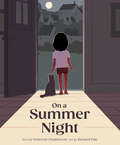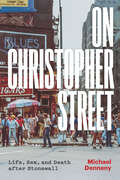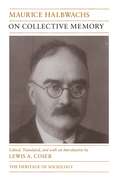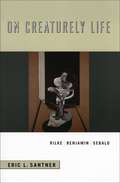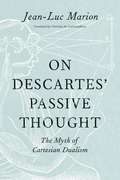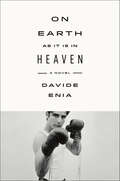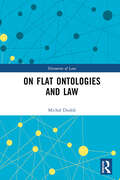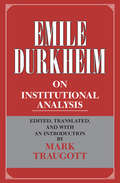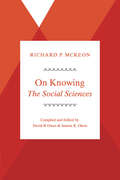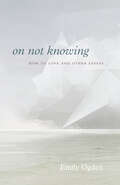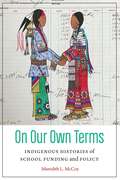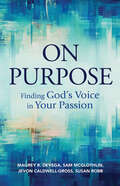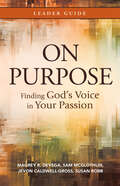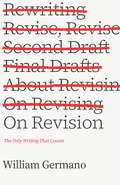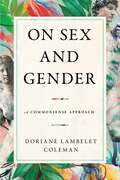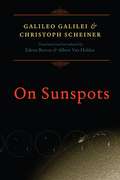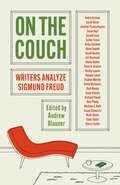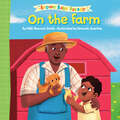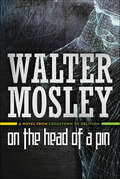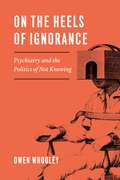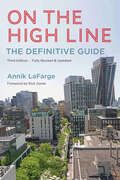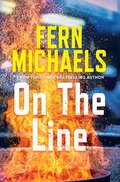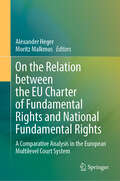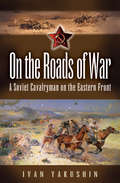- Table View
- List View
On a Summer Night
by Deborah HopkinsonStep into the quiet magic of this celebration of summer nighttime and the mystery of a world lit differently by the moon.On a summer night, the world is still. Even the crickets think it’s too hot to sing. But all at once, a girl wakes. In the kitchen, the cat rolls onto its soft paws. A neighbor’s small white dog yaps, a brown rabbit peeks from a hedge, and the leaves of a cherry tree begin to stir in the breeze. Readers witness and wonder: Who has woken them all? In this soothing bedtime story, the quiet of a warm summer night is brought to vivid, magical life with the soft steps of bare feet, the padding of paws, and the bright, golden light of the moon. One by one, each creature is roused and then gently returned to sleep in a lovely and lyrical exploration of wakefulness, restfulness, and the mysterious calm of the night.PERFECT FOR BEDTIME . . . OR ANYTIME: This beautifully illustrated children's book is ideal for soothing young readers to sleep—or encouraging a contemplative break in an energetic day. The story’s engagement with the wonders of nighttime will help children feel comforted by the dark and the prospect of going to sleep rather than afraid of them.READ-ALOUD READINESS: With its lyricism and short refrains, this gentle story is just right for sharing.CONNECTION TO NATURE: This magical book gradually reveals the moon as a character as it wakes girl, cat, dog, rabbit, tree, air, and cloud in turn—and connects them to one another through the welcoming quiet and wonder of a world gilded by moonlight.THE POWER OF SLOWING DOWN: Picture books are often wonderful excuses to slow down and share a moment of gentleness in kids' (and parents') busy lives; this book feels like a deep breath and offers a chance to wonder and reflect.Perfect for:Kids who can't sleep on hot summer nightsParents, grandparents, and caregivers seeking a sweet bedtime bookLibrarians and storytime leaders looking for a summer read-aloudGift givers who want to share a beautiful, lyrical book with someone specialReaders of such classic bedtime stories for kids as Goodnight Moon and The Going to Bed Book
On Christopher Street: Life, Sex, and Death after Stonewall
by Michael DennenyThrough the eyes of publishing icon Michael Denneny, this cultural autobiography traces the evolution of the US’s queer community in the three decades post-Stonewall. The Stonewall Riots of 1969 and the AIDS crisis of the 1980s have been captured in minute detail, and rightly memorialized in books, on tv, and in film as pivotal and powerful moments in queer history. Yet what about the moments in between—the tumultuous decade post-Stonewall when the queer community’s vitality and creativity exploded across the country, even as the AIDS crisis emerged? Michael Denneny was there for it all. As a founder and editor of the wildly influential magazine Christopher Street and later as the first openly gay editor at a major publishing house, Denneny critically shaped publishing around gay subjects in the 1970s and beyond. At St. Martin’s Press, he acquired a slew of landmark titles by gay authors—many for his groundbreaking Stonewall Inn Editions—propelling queer voices into the mainstream cultural conversation. On Christopher Street is Denneny’s time machine, going back to that heady period to lay out the unfolding geographies and storylines of gay lives and capturing the raw immediacy of his and his contemporaries’ daily lives as gay people in America. Through forty-one micro-chapters, he uses his journal writings, articles, interviews, and more from the 1970s and ‘80s to illuminate the twists and turns of a period of incomparable cultural ferment. One of the few surviving voices of his generation, Denneny transports us back in time to share those vibrant in-between moments in gay lives—the joy, sorrow, ecstasy, and energy—across three decades of queer history.
On Collective Memory (The Heritage of Sociology)
by Maurice HalbwachsHow do we use our mental images of the present to reconstruct our past? Maurice Halbwachs (1877-1945) addressed this question for the first time in his work on collective memory, which established him as a major figure in the history of sociology. This volume, the first comprehensive English-language translation of Halbwach's writings on the social construction of memory, fills a major gap in the literature on the sociology of knowledge.Halbwachs' primary thesis is that human memory can only function within a collective context. Collective memory, Halbwachs asserts, is always selective; various groups of people have different collective memories, which in turn give rise to different modes of behavior. Halbwachs shows, for example, how pilgrims to the Holy Land over the centuries evoked very different images of the events of Jesus' life; how wealthy old families in France have a memory of the past that diverges sharply from that of the nouveaux riches; and how working class construction of reality differ from those of their middle-class counterparts. With a detailed introduction by Lewis A. Coser, this translation will be an indispensable source for new research in historical sociology and cultural memory. Lewis A. Coser is Distinguished Professor of Sociology Emeritus at the State University of New York and Adjunct Professor of Sociology at Boston College.
On Creaturely Life: Rilke, Benjamin, Sebald
by Eric L. SanterIn his Duino Elegies, Rainer Maria Rilke suggests that animals enjoy direct access to a realm of being—the open—concealed from humans by the workings of consciousness and self-consciousness. In his own reading of Rilke, Martin Heidegger reclaims the open as the proper domain of human existence but suggests that human life remains haunted by vestiges of an animal-like relation to its surroundings. Walter Benjamin, in turn, was to show that such vestiges—what Eric Santner calls the creaturely—have a biopolitical aspect: they are linked to the processes that inscribe life in the realm of power and authority. Santner traces this theme of creaturely life from its poetic and philosophical beginnings in the first half of the twentieth century to the writings of the enigmatic German novelist W. G. Sebald. Sebald’s entire oeuvre, Santner argues, can be seen as an archive of creaturely life. For Sebald, the work on such an archive was inseparable from his understanding of what it means to engage ethically with another person’s history and pain, an engagement that transforms us from indifferent individuals into neighbors. An indispensable book for students of Sebald, On Creaturely Life is also a significant contribution to critical theory.
On Descartes' Passive Thought: The Myth of Cartesian Dualism
by Jean-Luc Marion,On Descartes’ Passive Thought is the culmination of a life-long reflection on the philosophy of Descartes by one of the most important living French philosophers. In it, Jean-Luc Marion examines anew some of the questions left unresolved in his previous books about Descartes, with a particular focus on Descartes’s theory of morals and the passions. Descartes has long been associated with mind-body dualism, but Marion argues here that this is a historical misattribution, popularized by Malebranche and popular ever since both within the academy and with the general public. Actually, Marion shows, Descartes held a holistic conception of body and mind. He called it the meum corpus, a passive mode of thinking, which implies far more than just pure mind—rather, it signifies a mind directly connected to the body: the human being that I am. Understood in this new light, the Descartes Marion uncovers through close readings of works such as Passions of the Soul resists prominent criticisms leveled at him by twentieth-century figures like Husserl and Heidegger, and even anticipates the non-dualistic, phenomenological concepts of human being discussed today. This is a momentous book that no serious historian of philosophy will be able to ignore.
On Earth As It Is in Heaven: A Novel
by Davide EniaA dark, gripping coming-of-age tale that explores violence, friendship, family, and what it means to be a manSummer, Palermo, early 1980s. The air hangs hot and heavy. The Mafia-ruled city is a powder keg ready to ignite. In a boxing gym, a fatherless nine-year-old boy climbs into the ring to face his first opponent.So begins On Earth as It Is in Heaven, a sweeping multigenerational saga that reaches back to the collapse of the Italian front in North Africa and forward to young Davidù's quest to become Italy's national boxing champion, a feat that has eluded the other men of his family.But Davide Enia, whose layered, lyrical, nonchronological novel caused a sensation when it was published in Italy in 2012, has crafted an epic that soars in miniature as well. The brutal struggles for dominance among Davidù's all male circle of friends; his strict but devoted grandmother, whose literacy is a badge of honor; his charismatic and manipulative great-uncle, who will become his trainer—the vicious scenes and sometimes unsympathetic characters Enia sketches land hard and true.On Earth as It Is in Heaven is both firmly grounded in what Leonardo Sciascia liked to call "Sicilitude" - the language and mentality of that eternally perplexing island - and devastatingly universal. A meditation on physical violence, love and sex, friendship and betrayal, boxing and ambition, Enia's novel is also a coming-of-age tale that speaks - sometimes crudely, but always honestly - about the joys and terrors of becoming a man.
On Flat Ontologies and Law (ISSN)
by Michał DudekThis book examines the importance of flat ontologies for law and sociolegal theory. Associated with the emergence of new materialism in the humanities and social sciences, the elaboration of flat ontologies challenges the binarism that has maintained the separation of culture from nature, and the human from the nonhuman. Although most work in legal theory and sociolegal studies continues to adopt a non-flat, anthropocentric and immaterial take on law, the critique of this perspective is becoming more and more influential. Engaging the increasing legal interest in flat ontologies, this book offers an account of the main theoretical perspectives, and their importance for law. Covering the work of the five major theorists in the area – Gabriel Tarde, Bruno Latour, Manuel DeLanda, Karen Barad and Graham Harman – the book aims to encourage this interest, as well as to explicate the important problems of and differences between these perspectives. Flat ontologies, the book demonstrates, can offer a valuable new perspective for understanding and thinking about law.This book will appeal mainly to scholars and students in legal theory and sociolegal studies; as well as others with interests in the posthumanist turn in philosophy and social theory.
On Institutional Analysis (Heritage Of Sociology Ser.)
by Emile DurkheimRanging from Durkheim's original lecture in sociology to an excerpt from the work incomplete at his death, these selections illuminate his multiple approaches to the crucial concept of social solidarity and the study of institutions as diverse as the law, morality, and the family. Durkheim's focus on social solidarity convinced him that sociology must investigate the way that individual behavior itself is the product of social forces. As these writings make clear, Durkheim pursued his powerful model of sociology through many fields, eventually synthesizing both materialist and idealist viewpoints into his functionalist model of society.
On Knowing: The Social Sciences
by Richard P. McKeonAs a philosopher, Richard McKeon spent his career developing Pragmatism in a new key, specifically by tracing the ways in which philosophic problems arise in fields other than philosophy—across the natural and social sciences and aesthetics—and showed the ways in which any problem, pushed back to its beginning or taken to its end, is a philosophic problem. The roots of this book, On Knowing—The Social Sciences, are traced to McKeon’s classes where he blended philosophy with physics, ethics, politics, history, and aesthetics. This volume—the second in a series—leaves behind natural science themes to embrace freedom, power, and history, which, McKeon argues, lay out the whole field of human action. The authors McKeon considers—Hobbes, Machiavelli, Spinoza, Kant, and J. S. Mill—show brilliantly how philosophic methods work in action, via analyses that do not merely reduce or deconstruct meaning, but enhance those texts by reconnecting them to the active history of philosophy and to problems of ethics, politics, and history. The waves of modernism and post-modernism are receding. Philosophic pluralism is now available, fully formulated, in McKeon’s work, spreading from the humanities to the social sciences.
On Not Knowing: How to Love and Other Essays
by Emily OgdenA beautifully written suite of personal essays on the value of not knowing. Moments of clarity are rare and fleeting; how can we become comfortable outside of them, in the more general condition of uncertainty within which we make our lives? Written by English professor Emily Ogden while her children were small, On Not Knowing forays into this rich, ambivalent space. Each of her sharply observed essays invites the reader to think with her about questions she can’t set aside: not knowing how to give birth, to listen, to hold it together, to love. Unapologetically capacious in her range of reference and idiosyncratic in the canon she draws on, Ogden moves nimbly among the registers of experience, from the operation of a breast pump to the art of herding cattle; from one-night stands to the stories of Edgar Allan Poe; from kayaking near a whale to a psychoanalytic meditation on drowning. Committed to the accumulation of knowledge, Ogden nonetheless finds that knowingness for her can be a way of getting stuck, a way of not really living. Rather than the defensiveness of willful ignorance, On Not Knowing celebrates the defenselessness of not knowing yet—possibly of not knowing ever. Ultimately, this book shows how resisting the temptation of knowingness and embracing the position of not knowing becomes a form of love.
On Othering: Processes and Politics of Unpeace (Global Peace Studies)
by Yasmin Saikia Chad HainesIn every sphere of life, division and intolerance has polarized communities and entire nations. The learned construction of the Other—an evil “enemy” against whom both physical and discursive violence is deemed acceptable—has fractured humanity, creating divisions that seemingly defy reconciliation. How do we restore the bonds of connection among human beings? How do we shift from polarization to peace? On Othering: Processes and Politics of Unpeace examines the process of othering from an international perspective and considers how it undermines peacemaking and is perpetuated by colonialism and globalization. Taking a humanistic approach, contributors argue that celebrating difference can have a transformative change in seeking peaceful solutions to problems created by people, institutions, ideas, conditions, and circumstances. Touching on race, gender, sexuality, nationalism, and our relationship with the natural world, this volume attends to the deep injustices brought about by othering and recommends actions for mending the relationships that are essential to renewing the possibility of peace.
On Our Own Terms: Indigenous Histories of School Funding and Policy (Indigenous Education)
by Meredith McCoyOn Our Own Terms contextualizes recent federal education legislation against the backdrop of two hundred years of education funding and policy to explore two critical themes: the racial and settler colonial dynamics that have shaped Indian education and an equally long and persistent tradition of Indigenous peoples engaging schools, funding, and policy on their own terms. Focusing primarily on the years 1819 to 2018, Meredith L. McCoy provides an interdisciplinary, methodologically expansive look into the ways federal Indian education policy has all too often been a tool for structural violence against Native peoples. Of particular note is a historical budget analysis that lays bare inconsistencies in federal support for Indian education and the ways funds become a tool for redefining educational priorities. McCoy shows some of the diverse strategies families, educators, and other community members have used to creatively navigate schooling on their own terms. These stories of strategic engagement with schools, funding, and policy embody what Gerald Vizenor has termed survivance, an insistence of Indigenous presence, trickster humor, and ironic engagement with settler structures. By gathering these stories together into an archive of survivance stories in education, McCoy invites readers to consider ongoing patterns of Indigenous resistance and the possibilities for bending federal systems toward community well-being.
On Purpose: Finding God's Voice in Your Passion
by Susan Robb Sam McGlothlin Jevon Caldwell-Gross Magrey deVegaBe part of something more.We are hungry for a sense of purpose, direction, and calling in our lives. That’s as basic an ingredient to the human experience as they come. We want to be part of something bigger than ourselves. We want to participate in something that has eternal merit and lasting impact. We do not want to live a shallow, hollow existence. We yearn for deeper meaning, for deeper purpose within our lives. We want to be more than we are.In On Purpose: Finding God’s Voice in Your Passion, authors Magrey deVega, Sam McGlothlin, Jevon Caldwell-Gross, and Susan Robb help us see God's purpose for our lives, how to open ourselves to God's voice, and how to take the first or next step to follow God's call. Reading this book and exploring life choices alongside others, individuals will learn how to channel their passions, hear God’s voice, and live the life they were meant to live.To support reading in a group, resources including a full leader’s guide and DVD with four teaching sessions are also available.
On Purpose Leader Guide: Finding God's Voice in Your Passion
by Susan Robb Sam McGlothlin Jevon Caldwell-Gross Magrey deVegaBe part of something more.We are hungry for a sense of purpose, direction, and calling in our lives. That’s as basic an ingredient to the human experience as they come. We want to be part of something bigger than ourselves. We want to participate in something that has eternal merit and lasting impact. We do not want to live a shallow, hollow existence. We yearn for deeper meaning, for deeper purpose within our lives. We want to be more than we are.In On Purpose: Finding God’s Voice in Your Passion, authors Magrey deVega, Sam McGlothlin, Jevon Caldwell-Gross, and Susan Robb help us see God's purpose for our lives, how to open ourselves to God's voice, and how to take the first or next step to follow God's call. As you read this book and explore your life alongside others, you’ll learn how to channel your passions, hear God’s voice, and live the life you were meant to live.The Leader Guide contains everything needed to guide a group through the four-week study, including session plans, activities, discussion questions, and multiple format options.Additional components for the four-week small group study include the book and DVD/Video Sessions featuring the authors.
On Revision: The Only Writing That Counts (Chicago Guides to Writing, Editing, and Publishing)
by William GermanoA trusted editor turns his attention to the most important part of writing: revision. So you’ve just finished writing something? Congratulations! Now revise it. Because revision is about getting from good to better, and it’s only finished when you decide to stop. But where to begin? In On Revision, William Germano shows authors how to take on the most critical stage of writing anything: rewriting it. For more than twenty years, thousands of writers have turned to Germano for his insider’s take on navigating the world of publishing. A professor, author, and veteran of the book industry, Germano knows what editors want and what writers need to know: Revising is not just correcting typos. Revising is about listening and seeing again. Revising is a rethinking of the principles from the ground up to understand why the writer is doing something, why they’re going somewhere, and why they’re taking the reader along with them.On Revision steps back to take in the big picture, showing authors how to hear their own writing voice and how to reread their work as if they didn’t write it. On Revision will show you how to know when your writing is actually done—and, until it is, what you need to do to get it there.
On Sex and Gender: A Commonsense Approach
by Doriane Lambelet ColemanAn eye-opening account of what the left and right get wrong about sex and gender—and how we can be a thoughtful, sex-smart society.On Sex and Gender focuses on three sequential and consequential questions: What is sex as opposed to gender? How does sex matter in our everyday lives? And how should it be reflected in law and policy? All three have been front-and-center in American life and politics since the rise of the trans rights movement: They are included in both major parties&’ political platforms. They are the subject of ongoing litigation in the federal courts and of highly contentious legislation on Capitol Hill. And they are a pivotal issue in the culture wars between left and right playing out around dinner tables, on campuses and school boards, on op-ed pages, and in corporate handbooks. Doriane Coleman challenges both sides to chart a better way. In a book that is equal parts scientific explanation, historical examination, and personal reflection, she argues that denying biological sex and focusing only on gender would have detrimental effects on women&’s equal opportunity, on men&’s future prospects, and on the health and welfare of society. Structural sexism needed to be dismantled—a true achievement of feminism and an ongoing fight—but going forward we should be sex smart, not sex blind. This book is a clear guide for reasonable Americans on sex and gender—something everyone wants to understand but is terrified to discuss. Coleman shows that the science is settled, but equally that there is a middle ground where common sense reigns and we can support transgender people without denying the facts of human biology. She livens her narrative with a sequence of portraits of exceptional human beings from legal pioneers like Myra Bradwell and Ketanji Brown Jackson to champion athletes like Caster Semenya and Cate Campbell to civil rights giants like Ruth Bader Ginsburg and Pauli Murray. Above all, Coleman reminds us that sex not only exists, but is also good—and she shows how we can get both sex and gender right for society.
On Sunspots
by Galileo Galilei Christoph ScheinerGalileo’s telescopic discoveries, and especially his observation of sunspots, caused great debate in an age when the heavens were thought to be perfect and unchanging. Christoph Scheiner, a Jesuit mathematician, argued that sunspots were planets or moons crossing in front of the Sun. Galileo, on the other hand, countered that the spots were on or near the surface of the Sun itself, and he supported his position with a series of meticulous observations and mathematical demonstrations that eventually convinced even his rival. On Sunspots collects the correspondence that constituted the public debate, including the first English translation of Scheiner’s two tracts as well as Galileo’s three letters, which have previously appeared only in abridged form. In addition, Albert Van Helden and Eileen Reeves have supplemented the correspondence with lengthy introductions, extensive notes, and a bibliography. The result will become the standard work on the subject, essential for students and historians of astronomy, the telescope, and early modern Catholicism.
On the Couch: Writers Analyze Sigmund Freud
by Andrew BlaunerA collection of colorful and candid essays and other pieces about Freud and his legacy today, featuring twenty-five leading writersWith original contributions by André Aciman • Sarah Boxer • Jennifer Finney Boylan • Susie Boyt • Gerald Early • Esther Freud • Rivka Galchen • Adam Gopnik • David Gordon • Siri Hustvedt • Sheila Kohler • Peter D. Kramer • Phillip Lopate • Thomas Lynch • Daphne Merkin • David Michaelis • Rick Moody • Susie Orbach • Richard Panek • Alex Pheby • Michael S. Roth • Casey Schwartz • Mark Solms • Colm Tóibín • Sherry TurkleW. H. Auden described Sigmund Freud (1856–1939) as &“a whole climate of opinion / Under whom we conduct our differing lives.&” The controversial father of psychiatry and psychoanalysis, Freud charted the human unconscious, brought us the talking cure, and wrote books that now rank among the classics of world literature. In On the Couch, the great analyst is analyzed by some of today&’s great writers and thinkers, who help us understand the man who has helped us understand ourselves as much, if not more, than anyone else, ever. The result is a fresh, multifaceted reassessment of Freud&’s continuing relevance and influence on ideas, literature, culture, science, and more.Here, Colm Tóibín writes about Freud, World War I, Henry James, and Thomas Mann; Adam Gopnik explores Freud&’s Civilization and Its Discontents; Susie Orbach considers Freud&’s &“ordinary unhappiness&” and D. W. Winnicott&’s &“good enough&”; Jennifer Finney Boylan reflects on penis envy and gender identity; Peter Kramer describes how new science and drugs have revolutionized psychology since Freud; Susie Boyt, one of Freud&’s great-granddaughters, spends the night at the Freud Museum in London; Siri Hustvedt examines Freud&’s divided reception today; and there&’s much more.Filled with insights, provocation, and humor, On the Couch offers an original and nuanced portrait of Freud as a complex figure who, for all his flaws, forever changed how we see ourselves and the world.
On the Farm: A Brown Baby Parade Book (Brown Baby Parade)
by Nikki Shannon SmithThere is a lot to do on the family farm! Read along in this sturdy board book perfect for children ages 0-3 as a boy helps his grandfather in this next installment of the Brown Baby Parade series.Papa&’s farm is big.There&’s so much work to do!Papa smiles and says,&“I like to work with you!&”A little boy helps his grandpa weed the garden, feed the chicks, fix a fence to stop escaping goats, and so much more in this sweet story. Nikki Shannon Smith's soothing, rhythmic text and Amanda Quartey's warm, welcoming illustrations pair beautifully to create heartwarming scenes of everyday life. The joyful depiction of Black rural life will allow children to see themselves and encourage interest in their local farming communities!
On the Head of a Pin: Two Short Novels From Crosstown To Oblivion (From Crosstown to Oblivion)
by Walter MosleyIn Walter Mosley's On the Head of a Pin, Joshua Winterland and Ana Fried are working at Jennings-Tremont Enterprises when they make the most important discovery in the history of this world—or possibly the next. JTE is developing advanced animatronics editing techniques to create high-end movies indistinguishable from live-action. Long dead stars can now share the screen with today's A-list. But one night Joshua and Ana discover something lingering in the rendered footage…an entity that will lead them into a new age beyond the reality they have come to know.At the Publisher's request, this title is being sold without Digital Rights Management Software (DRM) applied.
On the Heels of Ignorance: Psychiatry and the Politics of Not Knowing
by Owen WhooleyPsychiatry has always aimed to peer deep into the human mind, daring to cast light on its darkest corners and untangle its thorniest knots, often invoking the latest medical science in doing so. But, as Owen Whooley’s sweeping new book tells us, the history of American psychiatry is really a record of ignorance. On the Heels of Ignorance begins with psychiatry’s formal inception in the 1840s and moves through two centuries of constant struggle simply to define and redefine mental illness, to say nothing of the best way to treat it. Whooley’s book is no antipsychiatric screed, however; instead, he reveals a field that has muddled through periodic reinventions and conflicting agendas of curiosity, compassion, and professional striving. On the Heels of Ignorance draws from intellectual history and the sociology of professions to portray an ongoing human effort to make sense of complex mental phenomena using an imperfect set of tools, with sometimes tragic results.
On the High Line: The Definitive Guide
by Annik LaFargeThe most comprehensive, up-to-date, and acclaimed guide to the High Line by the leading expert on the history of the park—now in a fully revised editionBuilt atop a former freight railroad, the “park in the sky” is regularly cited as one of the premiere examples of adaptive reuse and quickly became one of New York’s most popular destinations, attracting more than 8 million visitors a year. This updated Third Edition of On the High Line— published to coincide with the fifteenth anniversary of the park’s opening—remains the definitive guide to the park that transformed an entire neighborhood and became an inspiration to cities around the globe.In short entries organized by roughly two city block sections, the guide provides rich details about everything in view on both sides of the park. Illustrated with more than 110 black & white photographs, it covers historic and modern architecture; plants and horticulture; and important industries and technological innovations that developed in the neighborhoods the park traverses, from book publishing and food distribution to the introduction of cold storage and the development of radar, the elevator, and talking movies. Updated to include newly opened sections of the park, this edition also features a new conversation pertaining to the more controversial side of the High Line’s story and how it became a poster child for the most grievous manifestations of gentrification and inequity in public spaces. Author Annik LaFarge provides a frank discussion on how the park’s leadership created a platform for discussing these issues and for advising other projects on how to work more inclusively and from a social justice and equity perspective.On the High Line serves as an educated travel companion, someone invisibly perched on a visitor’s shoulder who can answer every question, including what was here before, moving back in time through the early 20th century, the Industrial Revolution, and the colonial and pre-European times when this stretch of what we call Manhattan was home to the Lenape people and much of it was covered by the waters of the Hudson River. A companion website with more than 650 photos—historic, contemporary, rooftop and aerial—can be viewed at HighLineBook.com.
On the Line: A Riveting Novel of Suspense
by Fern MichaelsThe masterful storytelling and gripping suspense that are trademarks of the beloved #1 New York Times bestselling author combine in this thrilling story perfect for fans of Nora Roberts and James Patterson… Mateo Castillo is a rising star chef on the Manhattan culinary scene. But just as he&’s about to reap the rewards of his skill and hard work by being featured on a major TV cooking competition, Mateo collapses in his restaurant&’s kitchen—and regains consciousness in a hospital emergency room. If it weren&’t for a security guard finding him in time, Mateo would have bled to death. The cause of his sudden illness is as mysterious as it is worrying, and Mateo and his family undergo a battery of genetic tests. Yet the answers that start to emerge only raise more questions. Mateo&’s parents fled their home in Colombia many years ago, seeking refuge from the infamous cartels. Now the test results threaten to uncover a dark secret that exposes his family to dangers from the past—while clouding the investigation into who is trying to hurt Mateo in the present . . .
On the Relation between the EU Charter of Fundamental Rights and National Fundamental Rights: A Comparative Analysis in the European Multilevel Court System
by Alexander Heger Moritz MalkmusThe sometimes complex and controversial relation between the fundamental rights of the European Union, as enshrined in the EU Charter of Fundamental Rights (CFR), and national fundamental rights in the context of constitutional review is reflected in a series of landmark decisions in the multilateral cooperation of European courts, which have reshaped the fundamental rights architecture in the multilevel system in recent decades. This book aims to contribute to a systematic and comprehensive analysis of the EU and constitutional law issues involved, thus serving as a reference point for scholars and practitioners dealing with this emerging topic in depth. Following this approach, it sheds light on the broader Union legal context of these developments, examines the role of the CFR for Constitutional Courts, the relationship between constitutional and ordinary courts, and assesses the key decisions concerning the application of the CFR as a standard of constitutional review. It also draws some initial conclusions on the development of the European fundamental rights architecture, its prospects and possible implications for the Union’s legal order. The book contains several contributions by European legal experts from academia and the judiciary, who examine the different methods of constitutional application of the CFR from a comparative law perspective. These contributions deal with the following aspects: first, the role of the CFR for the respective Constitutional Court with regard to the application of EU law as well as national law falling within the scope of the CFR; second, the relationship between the respective Constitutional Court and the ordinary courts with regard to the application of the CFR; third, the relevant facts and legal reasoning of the most important Constitutional Court decisions on the application of the CFR as a relevant standard of constitutional review; fourth, the relevant case law of the CJEU on the relationship between Union and national fundamental rights, as well as its broader implications for the multilateral cooperation of European courts. The individual chapters examine, inter alia, the following decisions: Verfassungsgerichtshof (Austria), March 14, 2012, U 466/11 et al.; Corte Constituzionale (Italy), January 23, 2019, Sentenza 20/2019; Bundesverfassungsgericht (Germany), November 6, 2019, 1 BvR 276/17; Tribunal Constitucional (Portugal), June 3, 2022, Acórdão 268/2022; Tribunal Constitucional (Spain), June 29, 2022, Sentencia Decision 89/2022.
On the Roads of War: A Soviet Cavalryman on the Eastern Front
by Ivan YakushinA World War II survivor describes his combat experiences as a member of the Red Army&’s 5th Guards Cavalry Division in the fight against the Nazi Germany. Ivan Yakushin survived the Siege of Leningrad, fought at the Battle of Kursk and pursued the retreating German army through Russia, Belorussia, Poland and into Germany itself. This is the story of his war. He tells the tale in his own words, with remarkable clarity of recall, and gives an authentic insight into what combat on the Eastern Front was like for the ordinary soldier. He also provides a detailed, firsthand record of cavalry operations during a highly mechanized war, and this gives his book its special value. The war for Yakushin began in Leningrad where he endured the terrifying first winter of the German siege. He describes the perils and privations that beset the city during a period in which over half a million civilians lost their lives. Yet it is his vivid recollections of his experiences as an artillery man, then a cavalry officer on the Eastern Front that are at the heart of this rare memoir. In the Kursk salient Yakushin was severely wounded in the legs, during the Nevel offensive and Operation Bagration he took part in daring cavalry raids behind the German lines and, as the Soviet army penetrated into East Prussia and Germany itself, he was confronted by increasingly desperate German units struggling to defend their homeland. His descriptions of the merciless fighting during these last months of the war, in particular against the fanatical German Volkssturm, make fascinating reading.
